Organisational Behaviour Report: Debenhams, Semester 1, 2024
VerifiedAdded on 2023/01/06
|17
|5105
|25
Report
AI Summary
This report provides an in-depth analysis of organizational behavior, focusing on the retail company Debenhams. It examines the influence of power, politics, and culture on both individual and team performance, highlighting how these factors shape the work environment. The report delves into motivational theories, evaluating content theories like Maslow's Hierarchy of Needs and Herzberg's Two-Factor Theory, as well as process theories, such as Vroom's Expectancy Theory, to understand how to enhance employee motivation and achieve organizational goals. Furthermore, it explores the characteristics of effective versus ineffective teams, providing insights into team dynamics and management strategies. Finally, the report discusses various philosophies and concepts related to organizational behavior, offering a comprehensive understanding of the subject matter and its practical applications within a business context.
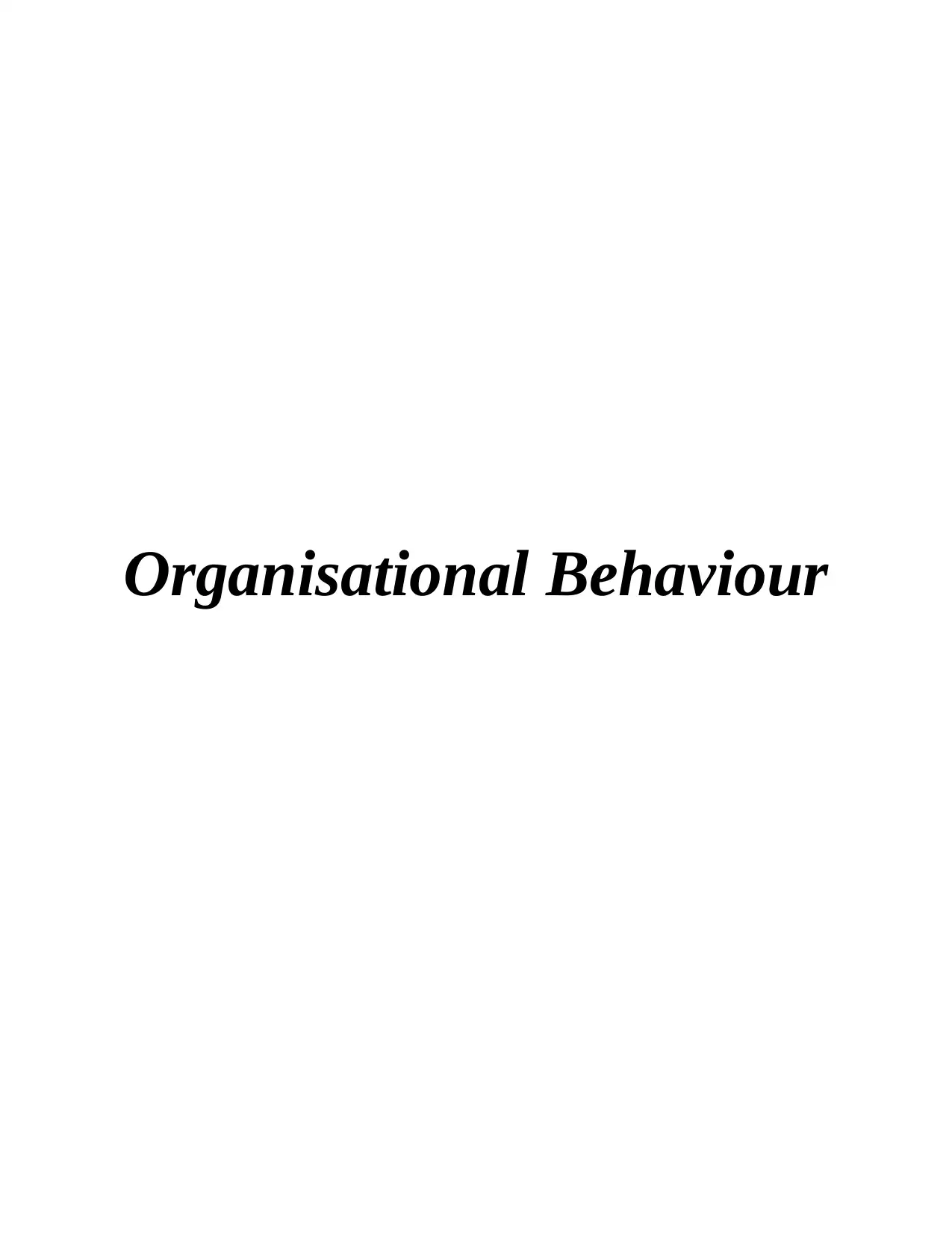
Organisational Behaviour
Paraphrase This Document
Need a fresh take? Get an instant paraphrase of this document with our AI Paraphraser
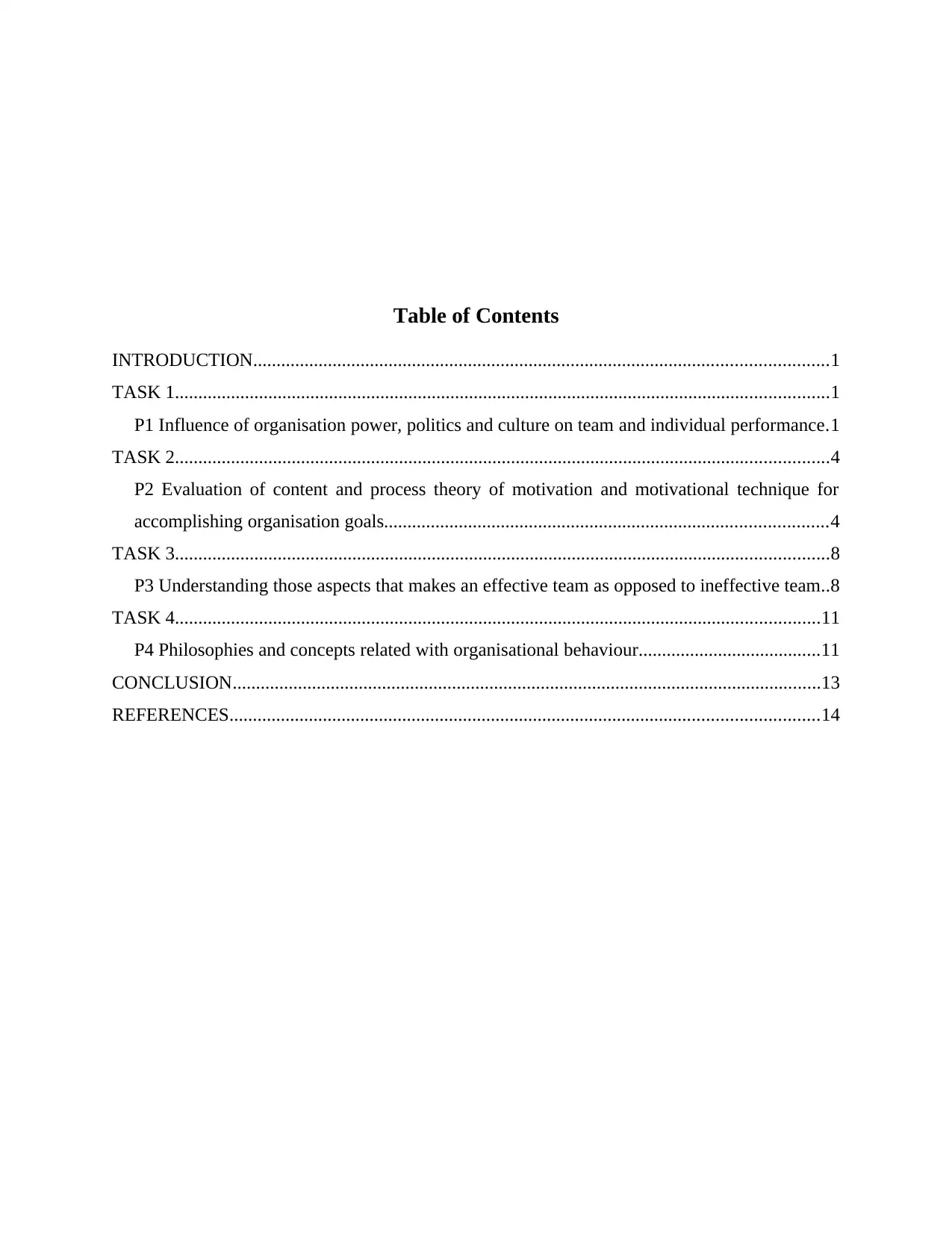
Table of Contents
INTRODUCTION...........................................................................................................................1
TASK 1............................................................................................................................................1
P1 Influence of organisation power, politics and culture on team and individual performance.1
TASK 2............................................................................................................................................4
P2 Evaluation of content and process theory of motivation and motivational technique for
accomplishing organisation goals...............................................................................................4
TASK 3............................................................................................................................................8
P3 Understanding those aspects that makes an effective team as opposed to ineffective team..8
TASK 4..........................................................................................................................................11
P4 Philosophies and concepts related with organisational behaviour.......................................11
CONCLUSION..............................................................................................................................13
REFERENCES..............................................................................................................................14
INTRODUCTION...........................................................................................................................1
TASK 1............................................................................................................................................1
P1 Influence of organisation power, politics and culture on team and individual performance.1
TASK 2............................................................................................................................................4
P2 Evaluation of content and process theory of motivation and motivational technique for
accomplishing organisation goals...............................................................................................4
TASK 3............................................................................................................................................8
P3 Understanding those aspects that makes an effective team as opposed to ineffective team..8
TASK 4..........................................................................................................................................11
P4 Philosophies and concepts related with organisational behaviour.......................................11
CONCLUSION..............................................................................................................................13
REFERENCES..............................................................................................................................14
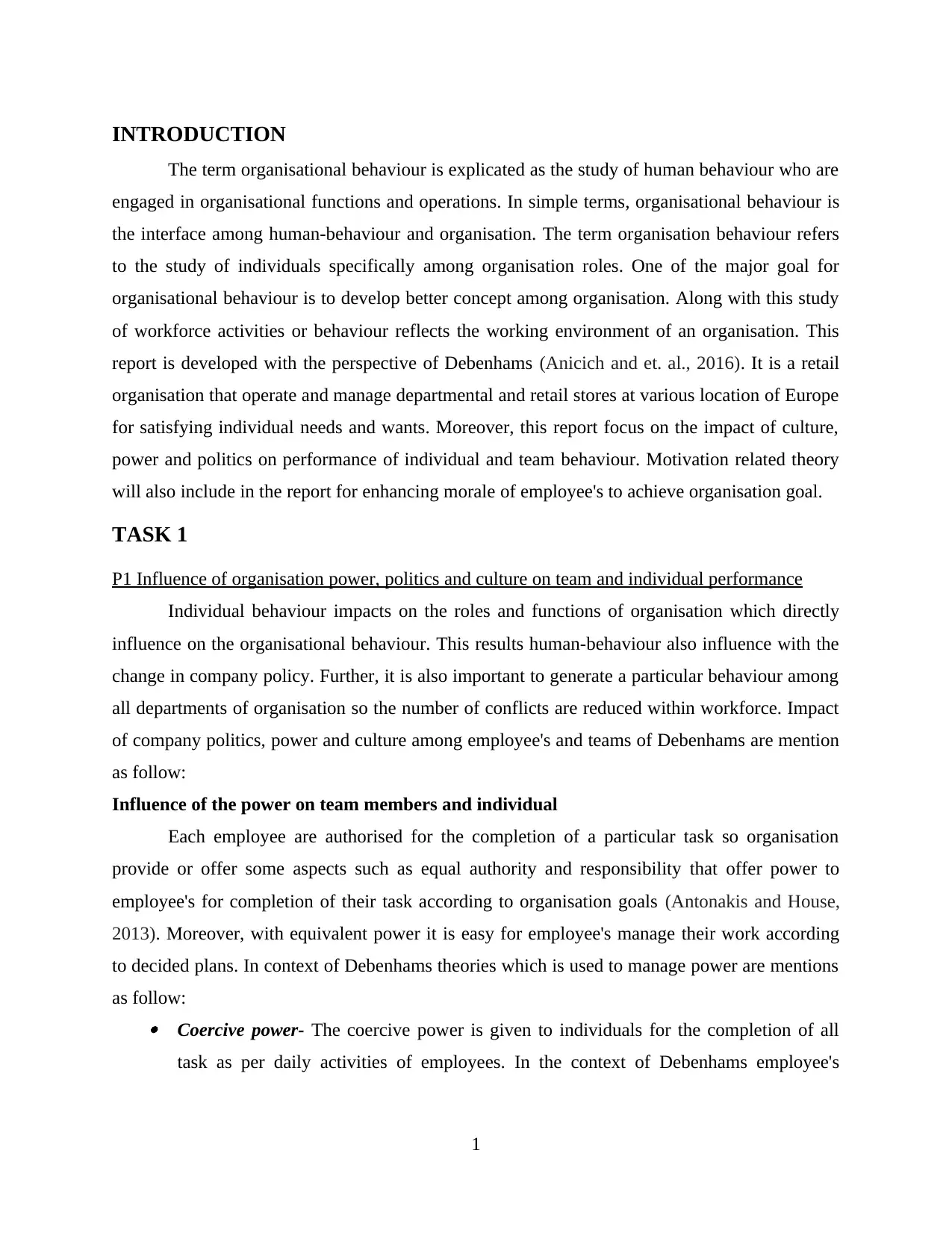
INTRODUCTION
The term organisational behaviour is explicated as the study of human behaviour who are
engaged in organisational functions and operations. In simple terms, organisational behaviour is
the interface among human-behaviour and organisation. The term organisation behaviour refers
to the study of individuals specifically among organisation roles. One of the major goal for
organisational behaviour is to develop better concept among organisation. Along with this study
of workforce activities or behaviour reflects the working environment of an organisation. This
report is developed with the perspective of Debenhams (Anicich and et. al., 2016). It is a retail
organisation that operate and manage departmental and retail stores at various location of Europe
for satisfying individual needs and wants. Moreover, this report focus on the impact of culture,
power and politics on performance of individual and team behaviour. Motivation related theory
will also include in the report for enhancing morale of employee's to achieve organisation goal.
TASK 1
P1 Influence of organisation power, politics and culture on team and individual performance
Individual behaviour impacts on the roles and functions of organisation which directly
influence on the organisational behaviour. This results human-behaviour also influence with the
change in company policy. Further, it is also important to generate a particular behaviour among
all departments of organisation so the number of conflicts are reduced within workforce. Impact
of company politics, power and culture among employee's and teams of Debenhams are mention
as follow:
Influence of the power on team members and individual
Each employee are authorised for the completion of a particular task so organisation
provide or offer some aspects such as equal authority and responsibility that offer power to
employee's for completion of their task according to organisation goals (Antonakis and House,
2013). Moreover, with equivalent power it is easy for employee's manage their work according
to decided plans. In context of Debenhams theories which is used to manage power are mentions
as follow: Coercive power- The coercive power is given to individuals for the completion of all
task as per daily activities of employees. In the context of Debenhams employee's
1
The term organisational behaviour is explicated as the study of human behaviour who are
engaged in organisational functions and operations. In simple terms, organisational behaviour is
the interface among human-behaviour and organisation. The term organisation behaviour refers
to the study of individuals specifically among organisation roles. One of the major goal for
organisational behaviour is to develop better concept among organisation. Along with this study
of workforce activities or behaviour reflects the working environment of an organisation. This
report is developed with the perspective of Debenhams (Anicich and et. al., 2016). It is a retail
organisation that operate and manage departmental and retail stores at various location of Europe
for satisfying individual needs and wants. Moreover, this report focus on the impact of culture,
power and politics on performance of individual and team behaviour. Motivation related theory
will also include in the report for enhancing morale of employee's to achieve organisation goal.
TASK 1
P1 Influence of organisation power, politics and culture on team and individual performance
Individual behaviour impacts on the roles and functions of organisation which directly
influence on the organisational behaviour. This results human-behaviour also influence with the
change in company policy. Further, it is also important to generate a particular behaviour among
all departments of organisation so the number of conflicts are reduced within workforce. Impact
of company politics, power and culture among employee's and teams of Debenhams are mention
as follow:
Influence of the power on team members and individual
Each employee are authorised for the completion of a particular task so organisation
provide or offer some aspects such as equal authority and responsibility that offer power to
employee's for completion of their task according to organisation goals (Antonakis and House,
2013). Moreover, with equivalent power it is easy for employee's manage their work according
to decided plans. In context of Debenhams theories which is used to manage power are mentions
as follow: Coercive power- The coercive power is given to individuals for the completion of all
task as per daily activities of employees. In the context of Debenhams employee's
1
⊘ This is a preview!⊘
Do you want full access?
Subscribe today to unlock all pages.

Trusted by 1+ million students worldwide
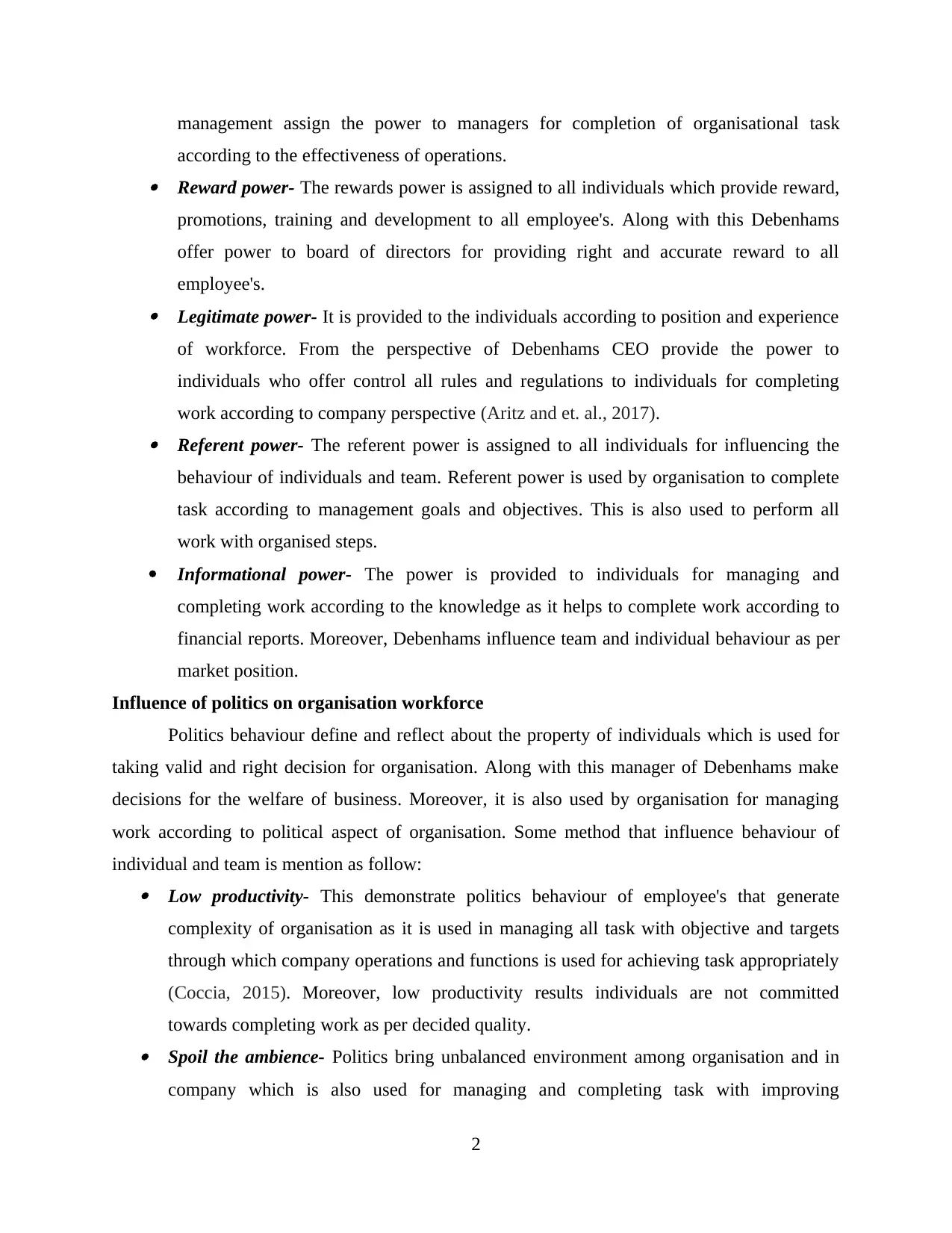
management assign the power to managers for completion of organisational task
according to the effectiveness of operations. Reward power- The rewards power is assigned to all individuals which provide reward,
promotions, training and development to all employee's. Along with this Debenhams
offer power to board of directors for providing right and accurate reward to all
employee's. Legitimate power- It is provided to the individuals according to position and experience
of workforce. From the perspective of Debenhams CEO provide the power to
individuals who offer control all rules and regulations to individuals for completing
work according to company perspective (Aritz and et. al., 2017). Referent power- The referent power is assigned to all individuals for influencing the
behaviour of individuals and team. Referent power is used by organisation to complete
task according to management goals and objectives. This is also used to perform all
work with organised steps.
Informational power- The power is provided to individuals for managing and
completing work according to the knowledge as it helps to complete work according to
financial reports. Moreover, Debenhams influence team and individual behaviour as per
market position.
Influence of politics on organisation workforce
Politics behaviour define and reflect about the property of individuals which is used for
taking valid and right decision for organisation. Along with this manager of Debenhams make
decisions for the welfare of business. Moreover, it is also used by organisation for managing
work according to political aspect of organisation. Some method that influence behaviour of
individual and team is mention as follow: Low productivity- This demonstrate politics behaviour of employee's that generate
complexity of organisation as it is used in managing all task with objective and targets
through which company operations and functions is used for achieving task appropriately
(Coccia, 2015). Moreover, low productivity results individuals are not committed
towards completing work as per decided quality. Spoil the ambience- Politics bring unbalanced environment among organisation and in
company which is also used for managing and completing task with improving
2
according to the effectiveness of operations. Reward power- The rewards power is assigned to all individuals which provide reward,
promotions, training and development to all employee's. Along with this Debenhams
offer power to board of directors for providing right and accurate reward to all
employee's. Legitimate power- It is provided to the individuals according to position and experience
of workforce. From the perspective of Debenhams CEO provide the power to
individuals who offer control all rules and regulations to individuals for completing
work according to company perspective (Aritz and et. al., 2017). Referent power- The referent power is assigned to all individuals for influencing the
behaviour of individuals and team. Referent power is used by organisation to complete
task according to management goals and objectives. This is also used to perform all
work with organised steps.
Informational power- The power is provided to individuals for managing and
completing work according to the knowledge as it helps to complete work according to
financial reports. Moreover, Debenhams influence team and individual behaviour as per
market position.
Influence of politics on organisation workforce
Politics behaviour define and reflect about the property of individuals which is used for
taking valid and right decision for organisation. Along with this manager of Debenhams make
decisions for the welfare of business. Moreover, it is also used by organisation for managing
work according to political aspect of organisation. Some method that influence behaviour of
individual and team is mention as follow: Low productivity- This demonstrate politics behaviour of employee's that generate
complexity of organisation as it is used in managing all task with objective and targets
through which company operations and functions is used for achieving task appropriately
(Coccia, 2015). Moreover, low productivity results individuals are not committed
towards completing work as per decided quality. Spoil the ambience- Politics bring unbalanced environment among organisation and in
company which is also used for managing and completing task with improving
2
Paraphrase This Document
Need a fresh take? Get an instant paraphrase of this document with our AI Paraphraser
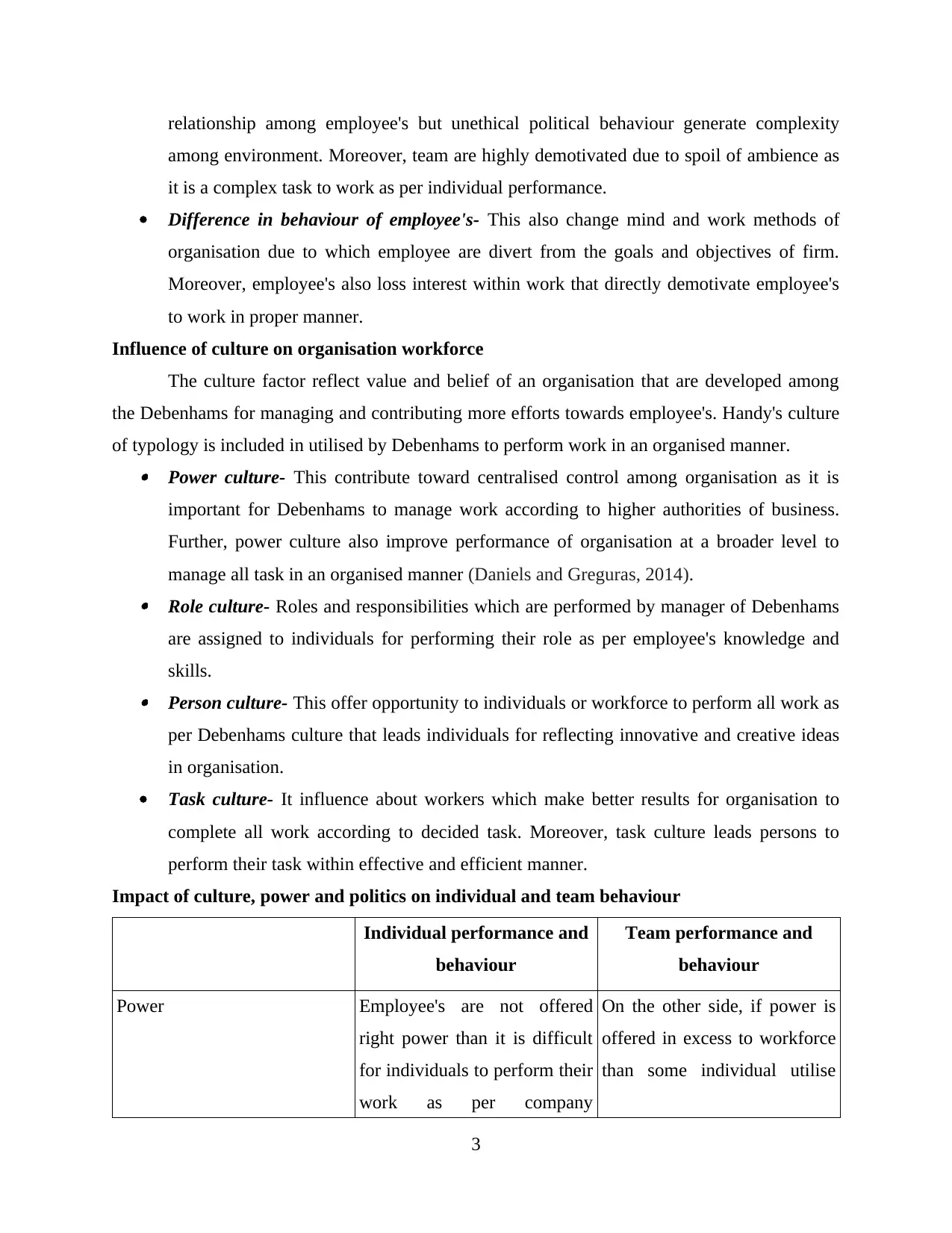
relationship among employee's but unethical political behaviour generate complexity
among environment. Moreover, team are highly demotivated due to spoil of ambience as
it is a complex task to work as per individual performance.
Difference in behaviour of employee's- This also change mind and work methods of
organisation due to which employee are divert from the goals and objectives of firm.
Moreover, employee's also loss interest within work that directly demotivate employee's
to work in proper manner.
Influence of culture on organisation workforce
The culture factor reflect value and belief of an organisation that are developed among
the Debenhams for managing and contributing more efforts towards employee's. Handy's culture
of typology is included in utilised by Debenhams to perform work in an organised manner. Power culture- This contribute toward centralised control among organisation as it is
important for Debenhams to manage work according to higher authorities of business.
Further, power culture also improve performance of organisation at a broader level to
manage all task in an organised manner (Daniels and Greguras, 2014). Role culture- Roles and responsibilities which are performed by manager of Debenhams
are assigned to individuals for performing their role as per employee's knowledge and
skills. Person culture- This offer opportunity to individuals or workforce to perform all work as
per Debenhams culture that leads individuals for reflecting innovative and creative ideas
in organisation.
Task culture- It influence about workers which make better results for organisation to
complete all work according to decided task. Moreover, task culture leads persons to
perform their task within effective and efficient manner.
Impact of culture, power and politics on individual and team behaviour
Individual performance and
behaviour
Team performance and
behaviour
Power Employee's are not offered
right power than it is difficult
for individuals to perform their
work as per company
On the other side, if power is
offered in excess to workforce
than some individual utilise
3
among environment. Moreover, team are highly demotivated due to spoil of ambience as
it is a complex task to work as per individual performance.
Difference in behaviour of employee's- This also change mind and work methods of
organisation due to which employee are divert from the goals and objectives of firm.
Moreover, employee's also loss interest within work that directly demotivate employee's
to work in proper manner.
Influence of culture on organisation workforce
The culture factor reflect value and belief of an organisation that are developed among
the Debenhams for managing and contributing more efforts towards employee's. Handy's culture
of typology is included in utilised by Debenhams to perform work in an organised manner. Power culture- This contribute toward centralised control among organisation as it is
important for Debenhams to manage work according to higher authorities of business.
Further, power culture also improve performance of organisation at a broader level to
manage all task in an organised manner (Daniels and Greguras, 2014). Role culture- Roles and responsibilities which are performed by manager of Debenhams
are assigned to individuals for performing their role as per employee's knowledge and
skills. Person culture- This offer opportunity to individuals or workforce to perform all work as
per Debenhams culture that leads individuals for reflecting innovative and creative ideas
in organisation.
Task culture- It influence about workers which make better results for organisation to
complete all work according to decided task. Moreover, task culture leads persons to
perform their task within effective and efficient manner.
Impact of culture, power and politics on individual and team behaviour
Individual performance and
behaviour
Team performance and
behaviour
Power Employee's are not offered
right power than it is difficult
for individuals to perform their
work as per company
On the other side, if power is
offered in excess to workforce
than some individual utilise
3
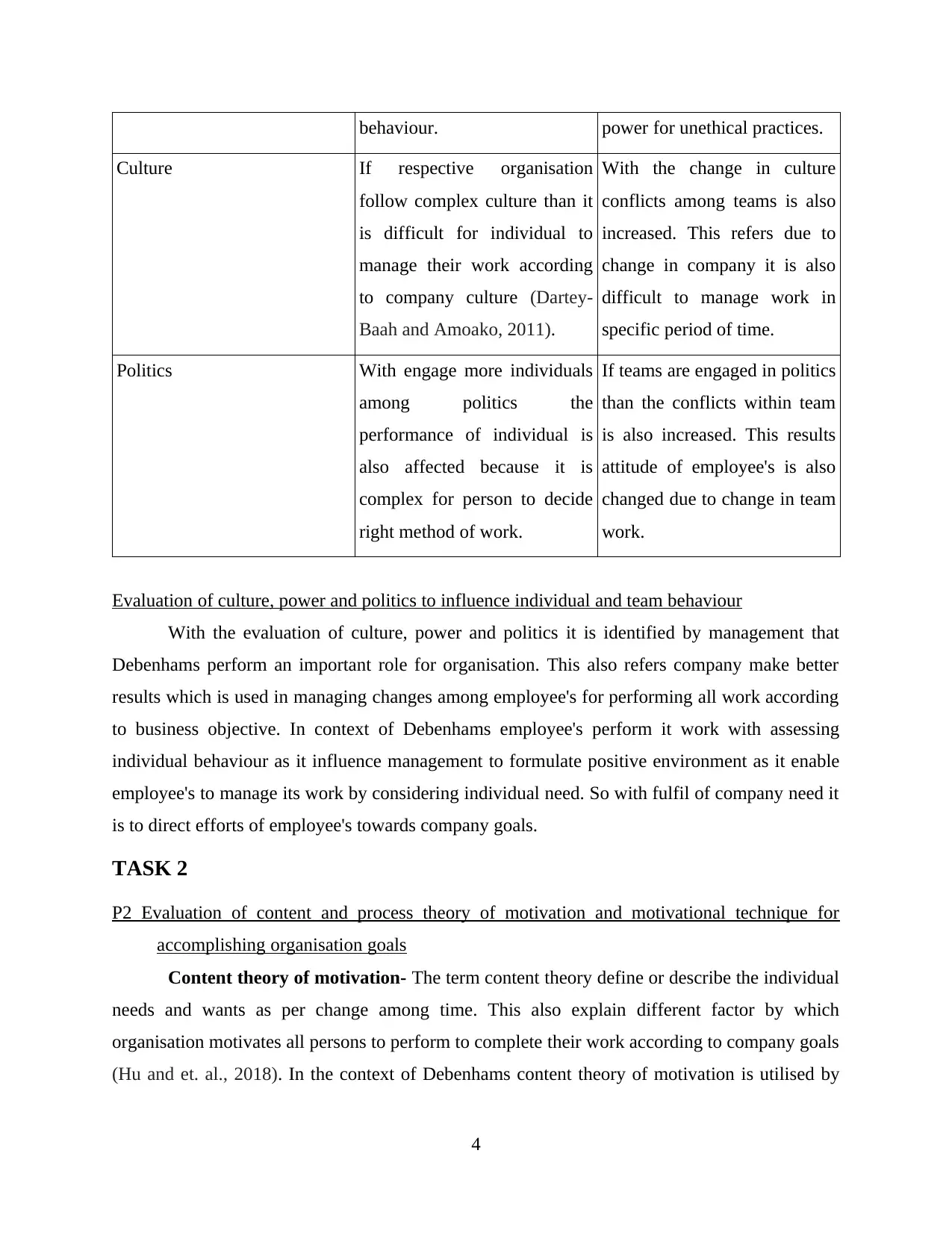
behaviour. power for unethical practices.
Culture If respective organisation
follow complex culture than it
is difficult for individual to
manage their work according
to company culture (Dartey-
Baah and Amoako, 2011).
With the change in culture
conflicts among teams is also
increased. This refers due to
change in company it is also
difficult to manage work in
specific period of time.
Politics With engage more individuals
among politics the
performance of individual is
also affected because it is
complex for person to decide
right method of work.
If teams are engaged in politics
than the conflicts within team
is also increased. This results
attitude of employee's is also
changed due to change in team
work.
Evaluation of culture, power and politics to influence individual and team behaviour
With the evaluation of culture, power and politics it is identified by management that
Debenhams perform an important role for organisation. This also refers company make better
results which is used in managing changes among employee's for performing all work according
to business objective. In context of Debenhams employee's perform it work with assessing
individual behaviour as it influence management to formulate positive environment as it enable
employee's to manage its work by considering individual need. So with fulfil of company need it
is to direct efforts of employee's towards company goals.
TASK 2
P2 Evaluation of content and process theory of motivation and motivational technique for
accomplishing organisation goals
Content theory of motivation- The term content theory define or describe the individual
needs and wants as per change among time. This also explain different factor by which
organisation motivates all persons to perform to complete their work according to company goals
(Hu and et. al., 2018). In the context of Debenhams content theory of motivation is utilised by
4
Culture If respective organisation
follow complex culture than it
is difficult for individual to
manage their work according
to company culture (Dartey-
Baah and Amoako, 2011).
With the change in culture
conflicts among teams is also
increased. This refers due to
change in company it is also
difficult to manage work in
specific period of time.
Politics With engage more individuals
among politics the
performance of individual is
also affected because it is
complex for person to decide
right method of work.
If teams are engaged in politics
than the conflicts within team
is also increased. This results
attitude of employee's is also
changed due to change in team
work.
Evaluation of culture, power and politics to influence individual and team behaviour
With the evaluation of culture, power and politics it is identified by management that
Debenhams perform an important role for organisation. This also refers company make better
results which is used in managing changes among employee's for performing all work according
to business objective. In context of Debenhams employee's perform it work with assessing
individual behaviour as it influence management to formulate positive environment as it enable
employee's to manage its work by considering individual need. So with fulfil of company need it
is to direct efforts of employee's towards company goals.
TASK 2
P2 Evaluation of content and process theory of motivation and motivational technique for
accomplishing organisation goals
Content theory of motivation- The term content theory define or describe the individual
needs and wants as per change among time. This also explain different factor by which
organisation motivates all persons to perform to complete their work according to company goals
(Hu and et. al., 2018). In the context of Debenhams content theory of motivation is utilised by
4
⊘ This is a preview!⊘
Do you want full access?
Subscribe today to unlock all pages.

Trusted by 1+ million students worldwide
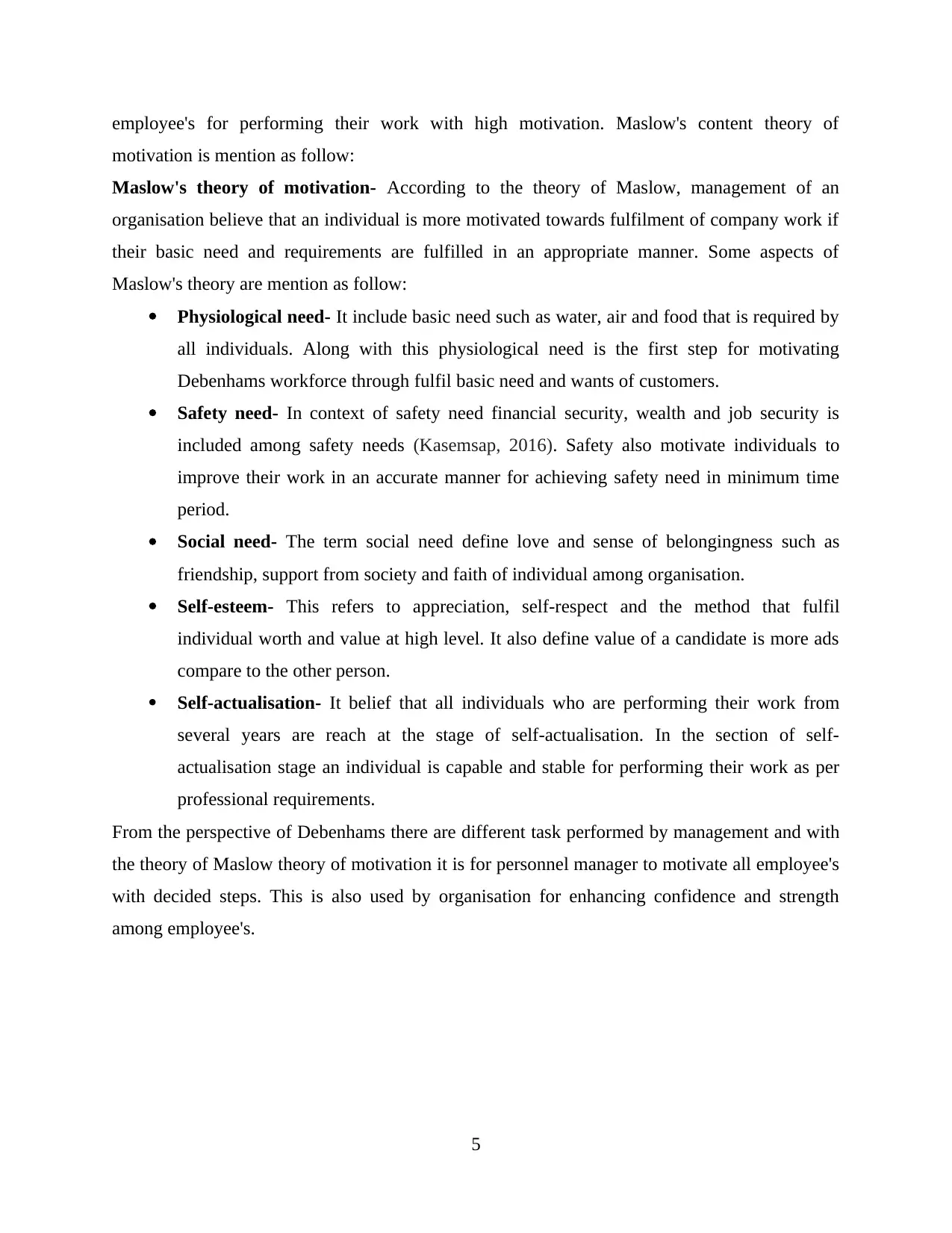
employee's for performing their work with high motivation. Maslow's content theory of
motivation is mention as follow:
Maslow's theory of motivation- According to the theory of Maslow, management of an
organisation believe that an individual is more motivated towards fulfilment of company work if
their basic need and requirements are fulfilled in an appropriate manner. Some aspects of
Maslow's theory are mention as follow:
Physiological need- It include basic need such as water, air and food that is required by
all individuals. Along with this physiological need is the first step for motivating
Debenhams workforce through fulfil basic need and wants of customers.
Safety need- In context of safety need financial security, wealth and job security is
included among safety needs (Kasemsap, 2016). Safety also motivate individuals to
improve their work in an accurate manner for achieving safety need in minimum time
period.
Social need- The term social need define love and sense of belongingness such as
friendship, support from society and faith of individual among organisation.
Self-esteem- This refers to appreciation, self-respect and the method that fulfil
individual worth and value at high level. It also define value of a candidate is more ads
compare to the other person.
Self-actualisation- It belief that all individuals who are performing their work from
several years are reach at the stage of self-actualisation. In the section of self-
actualisation stage an individual is capable and stable for performing their work as per
professional requirements.
From the perspective of Debenhams there are different task performed by management and with
the theory of Maslow theory of motivation it is for personnel manager to motivate all employee's
with decided steps. This is also used by organisation for enhancing confidence and strength
among employee's.
5
motivation is mention as follow:
Maslow's theory of motivation- According to the theory of Maslow, management of an
organisation believe that an individual is more motivated towards fulfilment of company work if
their basic need and requirements are fulfilled in an appropriate manner. Some aspects of
Maslow's theory are mention as follow:
Physiological need- It include basic need such as water, air and food that is required by
all individuals. Along with this physiological need is the first step for motivating
Debenhams workforce through fulfil basic need and wants of customers.
Safety need- In context of safety need financial security, wealth and job security is
included among safety needs (Kasemsap, 2016). Safety also motivate individuals to
improve their work in an accurate manner for achieving safety need in minimum time
period.
Social need- The term social need define love and sense of belongingness such as
friendship, support from society and faith of individual among organisation.
Self-esteem- This refers to appreciation, self-respect and the method that fulfil
individual worth and value at high level. It also define value of a candidate is more ads
compare to the other person.
Self-actualisation- It belief that all individuals who are performing their work from
several years are reach at the stage of self-actualisation. In the section of self-
actualisation stage an individual is capable and stable for performing their work as per
professional requirements.
From the perspective of Debenhams there are different task performed by management and with
the theory of Maslow theory of motivation it is for personnel manager to motivate all employee's
with decided steps. This is also used by organisation for enhancing confidence and strength
among employee's.
5
Paraphrase This Document
Need a fresh take? Get an instant paraphrase of this document with our AI Paraphraser
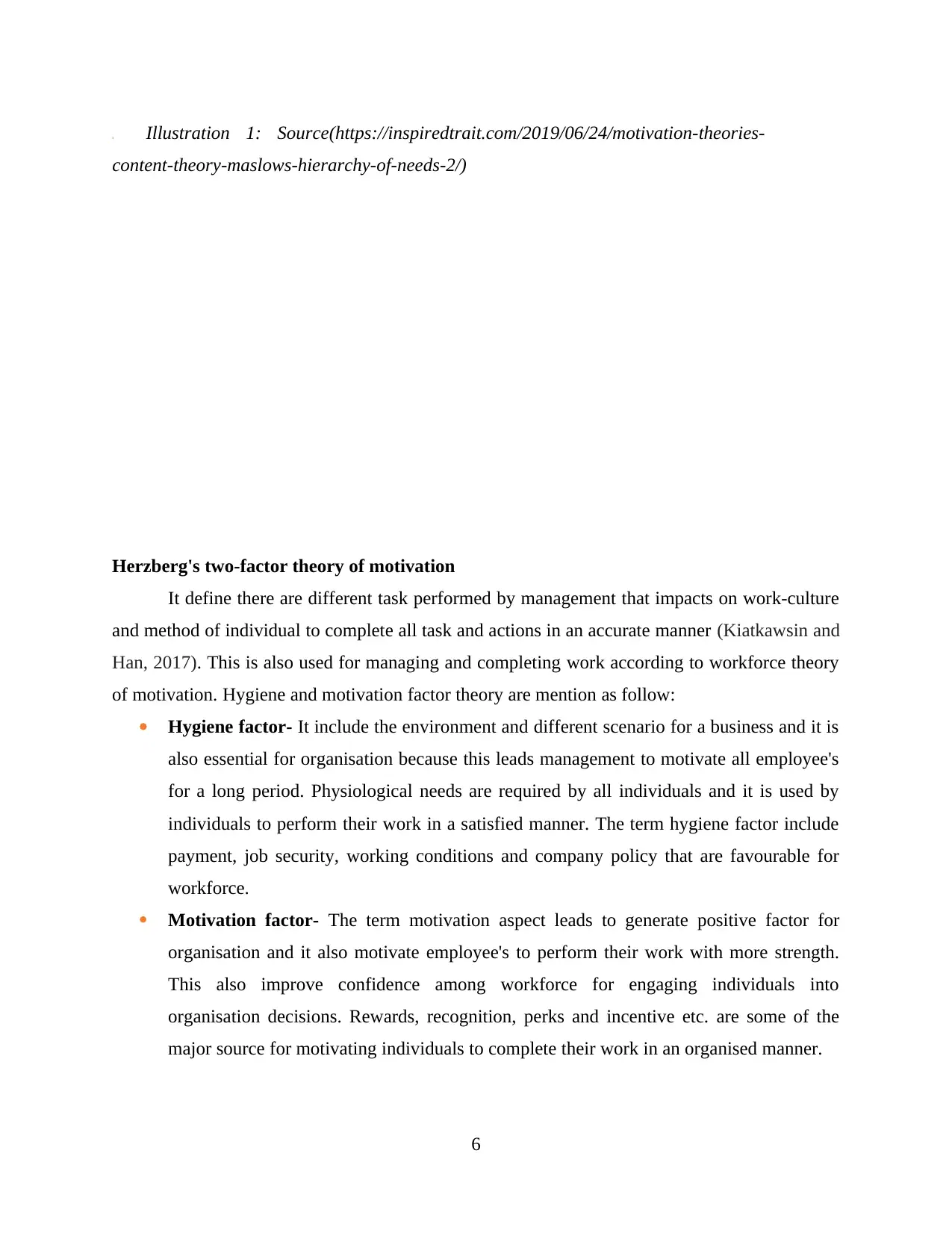
Illustration 1: Source(https://inspiredtrait.com/2019/06/24/motivation-theories-
content-theory-maslows-hierarchy-of-needs-2/)
Herzberg's two-factor theory of motivation
It define there are different task performed by management that impacts on work-culture
and method of individual to complete all task and actions in an accurate manner (Kiatkawsin and
Han, 2017). This is also used for managing and completing work according to workforce theory
of motivation. Hygiene and motivation factor theory are mention as follow:
Hygiene factor- It include the environment and different scenario for a business and it is
also essential for organisation because this leads management to motivate all employee's
for a long period. Physiological needs are required by all individuals and it is used by
individuals to perform their work in a satisfied manner. The term hygiene factor include
payment, job security, working conditions and company policy that are favourable for
workforce.
Motivation factor- The term motivation aspect leads to generate positive factor for
organisation and it also motivate employee's to perform their work with more strength.
This also improve confidence among workforce for engaging individuals into
organisation decisions. Rewards, recognition, perks and incentive etc. are some of the
major source for motivating individuals to complete their work in an organised manner.
6
content-theory-maslows-hierarchy-of-needs-2/)
Herzberg's two-factor theory of motivation
It define there are different task performed by management that impacts on work-culture
and method of individual to complete all task and actions in an accurate manner (Kiatkawsin and
Han, 2017). This is also used for managing and completing work according to workforce theory
of motivation. Hygiene and motivation factor theory are mention as follow:
Hygiene factor- It include the environment and different scenario for a business and it is
also essential for organisation because this leads management to motivate all employee's
for a long period. Physiological needs are required by all individuals and it is used by
individuals to perform their work in a satisfied manner. The term hygiene factor include
payment, job security, working conditions and company policy that are favourable for
workforce.
Motivation factor- The term motivation aspect leads to generate positive factor for
organisation and it also motivate employee's to perform their work with more strength.
This also improve confidence among workforce for engaging individuals into
organisation decisions. Rewards, recognition, perks and incentive etc. are some of the
major source for motivating individuals to complete their work in an organised manner.
6
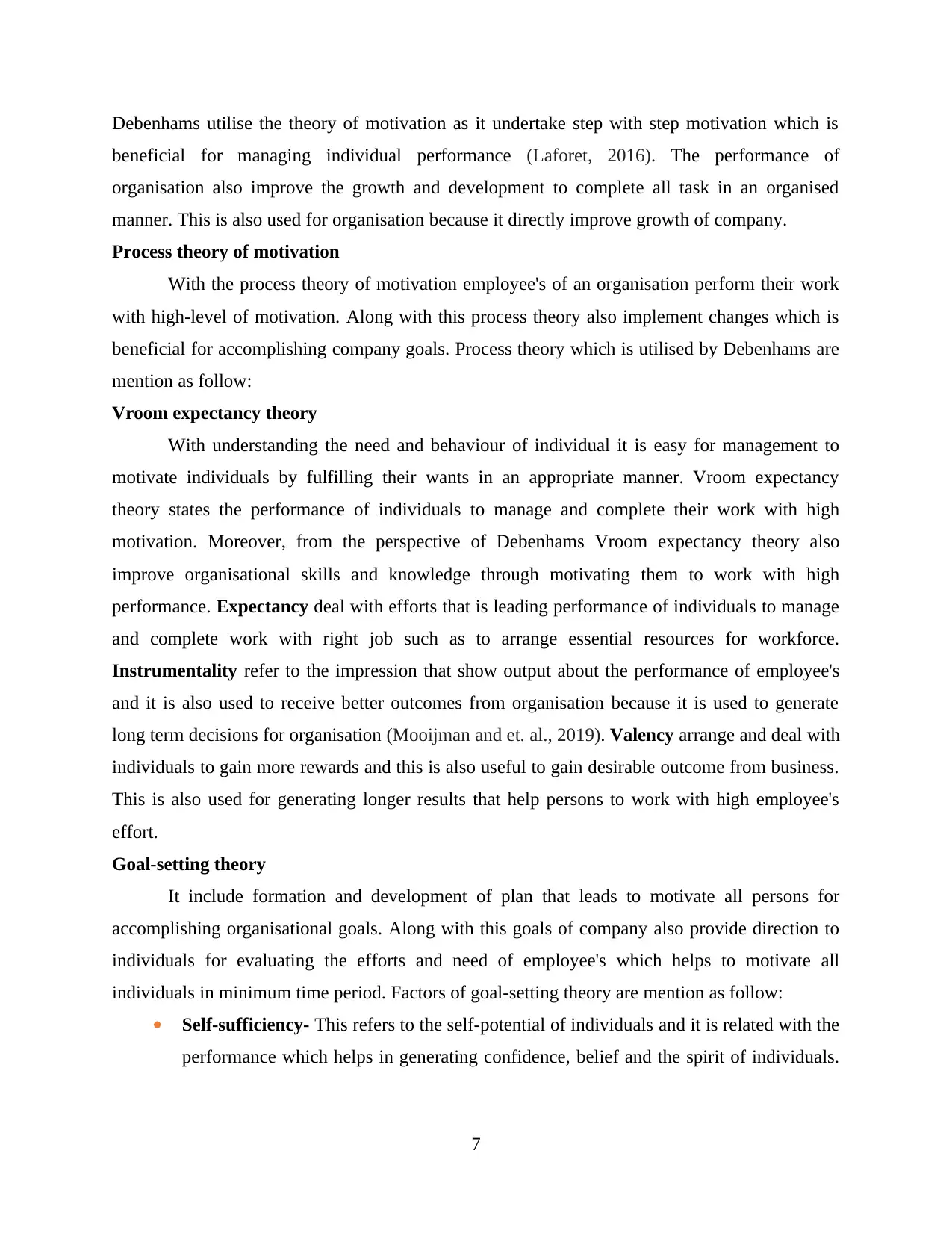
Debenhams utilise the theory of motivation as it undertake step with step motivation which is
beneficial for managing individual performance (Laforet, 2016). The performance of
organisation also improve the growth and development to complete all task in an organised
manner. This is also used for organisation because it directly improve growth of company.
Process theory of motivation
With the process theory of motivation employee's of an organisation perform their work
with high-level of motivation. Along with this process theory also implement changes which is
beneficial for accomplishing company goals. Process theory which is utilised by Debenhams are
mention as follow:
Vroom expectancy theory
With understanding the need and behaviour of individual it is easy for management to
motivate individuals by fulfilling their wants in an appropriate manner. Vroom expectancy
theory states the performance of individuals to manage and complete their work with high
motivation. Moreover, from the perspective of Debenhams Vroom expectancy theory also
improve organisational skills and knowledge through motivating them to work with high
performance. Expectancy deal with efforts that is leading performance of individuals to manage
and complete work with right job such as to arrange essential resources for workforce.
Instrumentality refer to the impression that show output about the performance of employee's
and it is also used to receive better outcomes from organisation because it is used to generate
long term decisions for organisation (Mooijman and et. al., 2019). Valency arrange and deal with
individuals to gain more rewards and this is also useful to gain desirable outcome from business.
This is also used for generating longer results that help persons to work with high employee's
effort.
Goal-setting theory
It include formation and development of plan that leads to motivate all persons for
accomplishing organisational goals. Along with this goals of company also provide direction to
individuals for evaluating the efforts and need of employee's which helps to motivate all
individuals in minimum time period. Factors of goal-setting theory are mention as follow:
Self-sufficiency- This refers to the self-potential of individuals and it is related with the
performance which helps in generating confidence, belief and the spirit of individuals.
7
beneficial for managing individual performance (Laforet, 2016). The performance of
organisation also improve the growth and development to complete all task in an organised
manner. This is also used for organisation because it directly improve growth of company.
Process theory of motivation
With the process theory of motivation employee's of an organisation perform their work
with high-level of motivation. Along with this process theory also implement changes which is
beneficial for accomplishing company goals. Process theory which is utilised by Debenhams are
mention as follow:
Vroom expectancy theory
With understanding the need and behaviour of individual it is easy for management to
motivate individuals by fulfilling their wants in an appropriate manner. Vroom expectancy
theory states the performance of individuals to manage and complete their work with high
motivation. Moreover, from the perspective of Debenhams Vroom expectancy theory also
improve organisational skills and knowledge through motivating them to work with high
performance. Expectancy deal with efforts that is leading performance of individuals to manage
and complete work with right job such as to arrange essential resources for workforce.
Instrumentality refer to the impression that show output about the performance of employee's
and it is also used to receive better outcomes from organisation because it is used to generate
long term decisions for organisation (Mooijman and et. al., 2019). Valency arrange and deal with
individuals to gain more rewards and this is also useful to gain desirable outcome from business.
This is also used for generating longer results that help persons to work with high employee's
effort.
Goal-setting theory
It include formation and development of plan that leads to motivate all persons for
accomplishing organisational goals. Along with this goals of company also provide direction to
individuals for evaluating the efforts and need of employee's which helps to motivate all
individuals in minimum time period. Factors of goal-setting theory are mention as follow:
Self-sufficiency- This refers to the self-potential of individuals and it is related with the
performance which helps in generating confidence, belief and the spirit of individuals.
7
⊘ This is a preview!⊘
Do you want full access?
Subscribe today to unlock all pages.

Trusted by 1+ million students worldwide
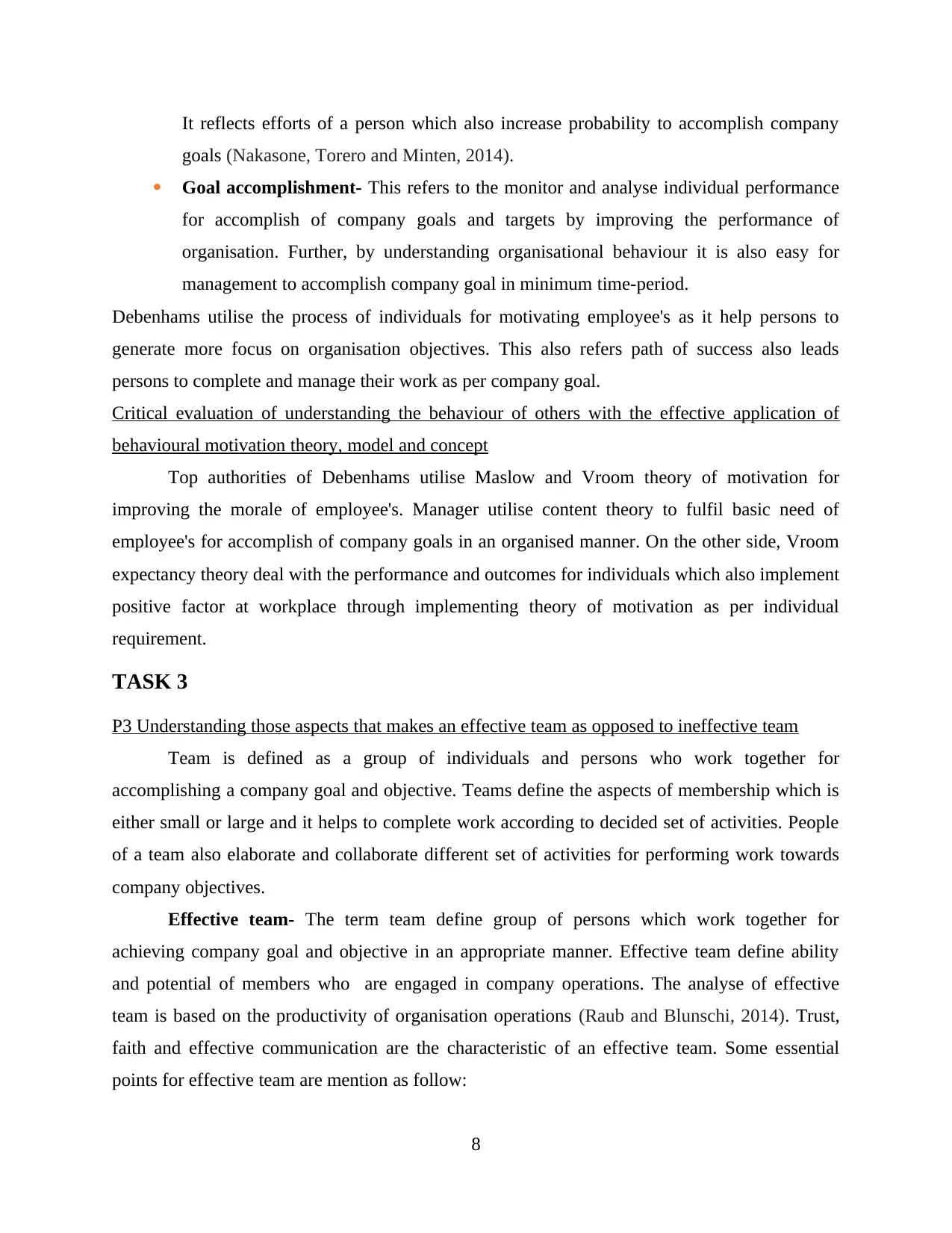
It reflects efforts of a person which also increase probability to accomplish company
goals (Nakasone, Torero and Minten, 2014).
Goal accomplishment- This refers to the monitor and analyse individual performance
for accomplish of company goals and targets by improving the performance of
organisation. Further, by understanding organisational behaviour it is also easy for
management to accomplish company goal in minimum time-period.
Debenhams utilise the process of individuals for motivating employee's as it help persons to
generate more focus on organisation objectives. This also refers path of success also leads
persons to complete and manage their work as per company goal.
Critical evaluation of understanding the behaviour of others with the effective application of
behavioural motivation theory, model and concept
Top authorities of Debenhams utilise Maslow and Vroom theory of motivation for
improving the morale of employee's. Manager utilise content theory to fulfil basic need of
employee's for accomplish of company goals in an organised manner. On the other side, Vroom
expectancy theory deal with the performance and outcomes for individuals which also implement
positive factor at workplace through implementing theory of motivation as per individual
requirement.
TASK 3
P3 Understanding those aspects that makes an effective team as opposed to ineffective team
Team is defined as a group of individuals and persons who work together for
accomplishing a company goal and objective. Teams define the aspects of membership which is
either small or large and it helps to complete work according to decided set of activities. People
of a team also elaborate and collaborate different set of activities for performing work towards
company objectives.
Effective team- The term team define group of persons which work together for
achieving company goal and objective in an appropriate manner. Effective team define ability
and potential of members who are engaged in company operations. The analyse of effective
team is based on the productivity of organisation operations (Raub and Blunschi, 2014). Trust,
faith and effective communication are the characteristic of an effective team. Some essential
points for effective team are mention as follow:
8
goals (Nakasone, Torero and Minten, 2014).
Goal accomplishment- This refers to the monitor and analyse individual performance
for accomplish of company goals and targets by improving the performance of
organisation. Further, by understanding organisational behaviour it is also easy for
management to accomplish company goal in minimum time-period.
Debenhams utilise the process of individuals for motivating employee's as it help persons to
generate more focus on organisation objectives. This also refers path of success also leads
persons to complete and manage their work as per company goal.
Critical evaluation of understanding the behaviour of others with the effective application of
behavioural motivation theory, model and concept
Top authorities of Debenhams utilise Maslow and Vroom theory of motivation for
improving the morale of employee's. Manager utilise content theory to fulfil basic need of
employee's for accomplish of company goals in an organised manner. On the other side, Vroom
expectancy theory deal with the performance and outcomes for individuals which also implement
positive factor at workplace through implementing theory of motivation as per individual
requirement.
TASK 3
P3 Understanding those aspects that makes an effective team as opposed to ineffective team
Team is defined as a group of individuals and persons who work together for
accomplishing a company goal and objective. Teams define the aspects of membership which is
either small or large and it helps to complete work according to decided set of activities. People
of a team also elaborate and collaborate different set of activities for performing work towards
company objectives.
Effective team- The term team define group of persons which work together for
achieving company goal and objective in an appropriate manner. Effective team define ability
and potential of members who are engaged in company operations. The analyse of effective
team is based on the productivity of organisation operations (Raub and Blunschi, 2014). Trust,
faith and effective communication are the characteristic of an effective team. Some essential
points for effective team are mention as follow:
8
Paraphrase This Document
Need a fresh take? Get an instant paraphrase of this document with our AI Paraphraser
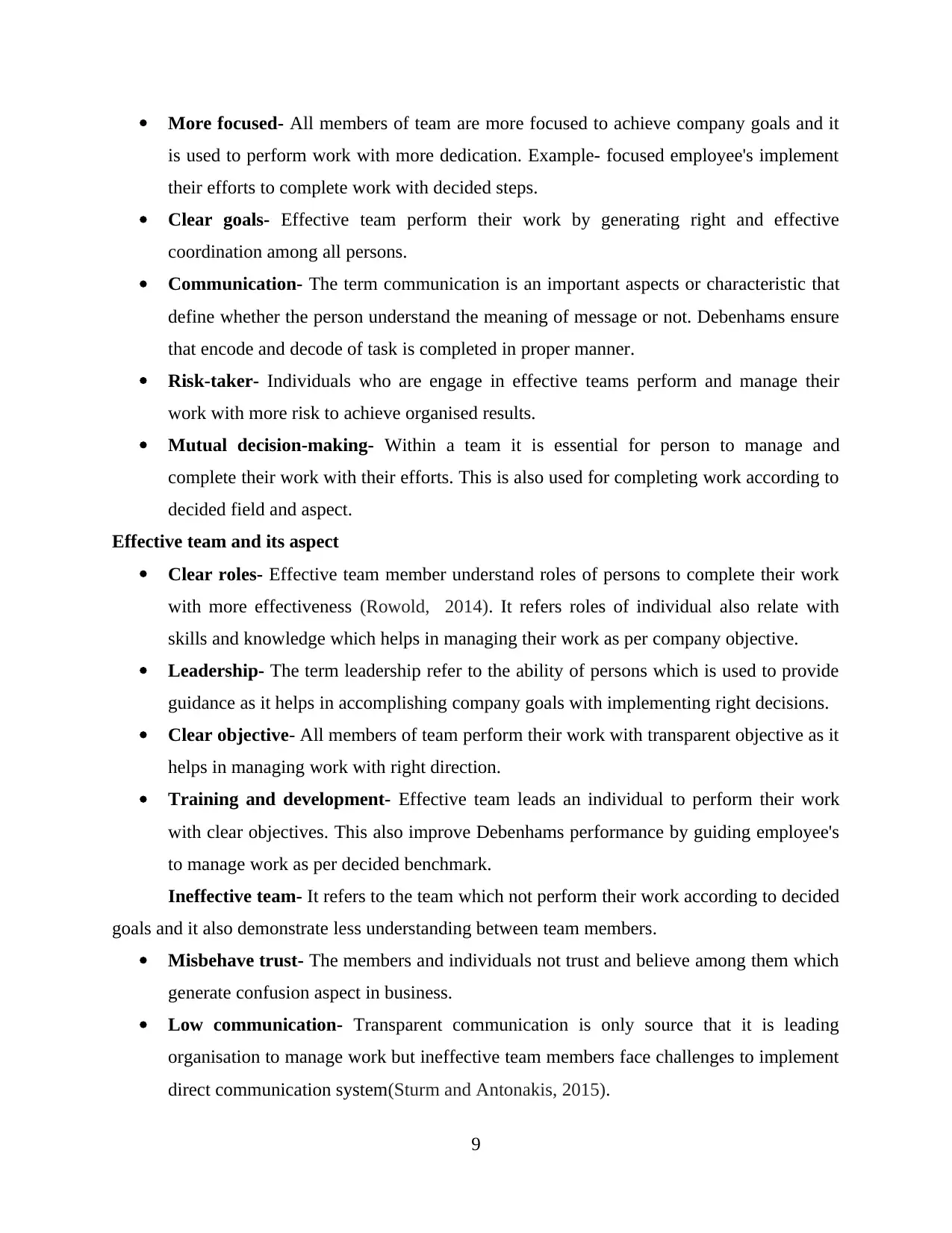
More focused- All members of team are more focused to achieve company goals and it
is used to perform work with more dedication. Example- focused employee's implement
their efforts to complete work with decided steps.
Clear goals- Effective team perform their work by generating right and effective
coordination among all persons.
Communication- The term communication is an important aspects or characteristic that
define whether the person understand the meaning of message or not. Debenhams ensure
that encode and decode of task is completed in proper manner.
Risk-taker- Individuals who are engage in effective teams perform and manage their
work with more risk to achieve organised results.
Mutual decision-making- Within a team it is essential for person to manage and
complete their work with their efforts. This is also used for completing work according to
decided field and aspect.
Effective team and its aspect
Clear roles- Effective team member understand roles of persons to complete their work
with more effectiveness (Rowold, 2014). It refers roles of individual also relate with
skills and knowledge which helps in managing their work as per company objective.
Leadership- The term leadership refer to the ability of persons which is used to provide
guidance as it helps in accomplishing company goals with implementing right decisions.
Clear objective- All members of team perform their work with transparent objective as it
helps in managing work with right direction.
Training and development- Effective team leads an individual to perform their work
with clear objectives. This also improve Debenhams performance by guiding employee's
to manage work as per decided benchmark.
Ineffective team- It refers to the team which not perform their work according to decided
goals and it also demonstrate less understanding between team members.
Misbehave trust- The members and individuals not trust and believe among them which
generate confusion aspect in business.
Low communication- Transparent communication is only source that it is leading
organisation to manage work but ineffective team members face challenges to implement
direct communication system(Sturm and Antonakis, 2015).
9
is used to perform work with more dedication. Example- focused employee's implement
their efforts to complete work with decided steps.
Clear goals- Effective team perform their work by generating right and effective
coordination among all persons.
Communication- The term communication is an important aspects or characteristic that
define whether the person understand the meaning of message or not. Debenhams ensure
that encode and decode of task is completed in proper manner.
Risk-taker- Individuals who are engage in effective teams perform and manage their
work with more risk to achieve organised results.
Mutual decision-making- Within a team it is essential for person to manage and
complete their work with their efforts. This is also used for completing work according to
decided field and aspect.
Effective team and its aspect
Clear roles- Effective team member understand roles of persons to complete their work
with more effectiveness (Rowold, 2014). It refers roles of individual also relate with
skills and knowledge which helps in managing their work as per company objective.
Leadership- The term leadership refer to the ability of persons which is used to provide
guidance as it helps in accomplishing company goals with implementing right decisions.
Clear objective- All members of team perform their work with transparent objective as it
helps in managing work with right direction.
Training and development- Effective team leads an individual to perform their work
with clear objectives. This also improve Debenhams performance by guiding employee's
to manage work as per decided benchmark.
Ineffective team- It refers to the team which not perform their work according to decided
goals and it also demonstrate less understanding between team members.
Misbehave trust- The members and individuals not trust and believe among them which
generate confusion aspect in business.
Low communication- Transparent communication is only source that it is leading
organisation to manage work but ineffective team members face challenges to implement
direct communication system(Sturm and Antonakis, 2015).
9
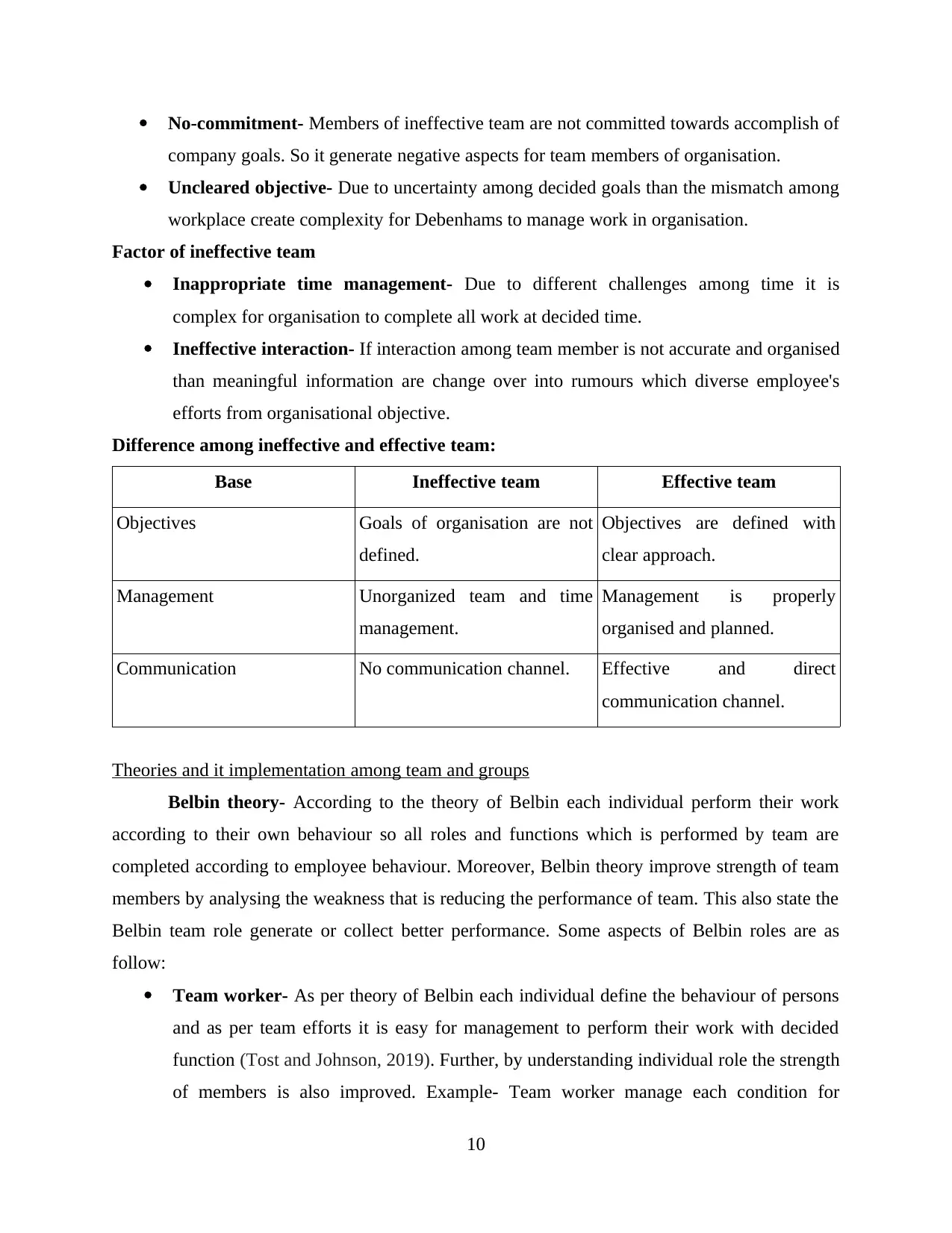
No-commitment- Members of ineffective team are not committed towards accomplish of
company goals. So it generate negative aspects for team members of organisation.
Uncleared objective- Due to uncertainty among decided goals than the mismatch among
workplace create complexity for Debenhams to manage work in organisation.
Factor of ineffective team
Inappropriate time management- Due to different challenges among time it is
complex for organisation to complete all work at decided time.
Ineffective interaction- If interaction among team member is not accurate and organised
than meaningful information are change over into rumours which diverse employee's
efforts from organisational objective.
Difference among ineffective and effective team:
Base Ineffective team Effective team
Objectives Goals of organisation are not
defined.
Objectives are defined with
clear approach.
Management Unorganized team and time
management.
Management is properly
organised and planned.
Communication No communication channel. Effective and direct
communication channel.
Theories and it implementation among team and groups
Belbin theory- According to the theory of Belbin each individual perform their work
according to their own behaviour so all roles and functions which is performed by team are
completed according to employee behaviour. Moreover, Belbin theory improve strength of team
members by analysing the weakness that is reducing the performance of team. This also state the
Belbin team role generate or collect better performance. Some aspects of Belbin roles are as
follow:
Team worker- As per theory of Belbin each individual define the behaviour of persons
and as per team efforts it is easy for management to perform their work with decided
function (Tost and Johnson, 2019). Further, by understanding individual role the strength
of members is also improved. Example- Team worker manage each condition for
10
company goals. So it generate negative aspects for team members of organisation.
Uncleared objective- Due to uncertainty among decided goals than the mismatch among
workplace create complexity for Debenhams to manage work in organisation.
Factor of ineffective team
Inappropriate time management- Due to different challenges among time it is
complex for organisation to complete all work at decided time.
Ineffective interaction- If interaction among team member is not accurate and organised
than meaningful information are change over into rumours which diverse employee's
efforts from organisational objective.
Difference among ineffective and effective team:
Base Ineffective team Effective team
Objectives Goals of organisation are not
defined.
Objectives are defined with
clear approach.
Management Unorganized team and time
management.
Management is properly
organised and planned.
Communication No communication channel. Effective and direct
communication channel.
Theories and it implementation among team and groups
Belbin theory- According to the theory of Belbin each individual perform their work
according to their own behaviour so all roles and functions which is performed by team are
completed according to employee behaviour. Moreover, Belbin theory improve strength of team
members by analysing the weakness that is reducing the performance of team. This also state the
Belbin team role generate or collect better performance. Some aspects of Belbin roles are as
follow:
Team worker- As per theory of Belbin each individual define the behaviour of persons
and as per team efforts it is easy for management to perform their work with decided
function (Tost and Johnson, 2019). Further, by understanding individual role the strength
of members is also improved. Example- Team worker manage each condition for
10
⊘ This is a preview!⊘
Do you want full access?
Subscribe today to unlock all pages.

Trusted by 1+ million students worldwide
1 out of 17
Related Documents
Your All-in-One AI-Powered Toolkit for Academic Success.
+13062052269
info@desklib.com
Available 24*7 on WhatsApp / Email
![[object Object]](/_next/static/media/star-bottom.7253800d.svg)
Unlock your academic potential
Copyright © 2020–2025 A2Z Services. All Rights Reserved. Developed and managed by ZUCOL.





